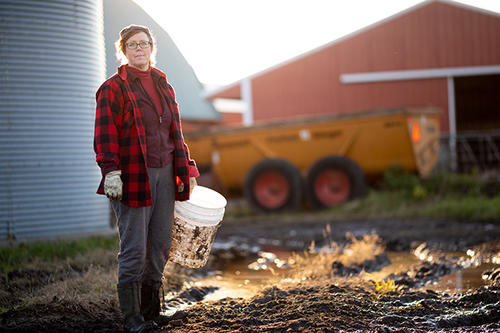
Meg Moynihan and her husband, Kevin Stuedemann, own Derrydale Farm in Minnesota’s Le Sueur County, where they milk about 70 certified organic cows. In March 2016, the cooperative that picked up the farm’s organic milk changed its route, leaving them without a buyer. It wasn’t until the end of that year that another organic cooperative agreed to take their milk. Moynihan says that those nine months they struggled to keep their heads above water were filled with uncertainty, fear, and stress.
Moynihan and Stuedemann’s story is all too common across Minnesota and the rest of farm country.
“It’s difficult to fully understand what stress does to agricultural communities and it’s hard to count the suicides, let alone quantify depression, substance abuse, divorces, and other impacts on the family, including the children,” says Bruce Alexander, professor and head of the Division of Environmental Health Sciences in the School of Public Health.
Alexander guides SPH’s Upper Midwest Agricultural Safety and Health Center (UMASH), a collaboration of five leading health care and public research institutions, in expanding its mission of improving the health and safety of agricultural workers and their families to include improving their mental health.
The center itself is a partnership of SPH and the U’s College of Veterinary Medicine, the Minnesota Department of Health, the National Farm Medicine Center at the Marshfield Clinic, and the Migrant Clinicians Network. It concentrates on farmers, farm workers, and their families in five states, with a number of projects in partnership with various communities.
According to Moynihan, one of the things UMASH is doing well is shining a light on stress and reframing it as another health and safety challenge on the farm, making it a little easier for farmers to seek help. “And when the organization giving those messages is one that farmers trust and are used to hearing from, as UMASH is, they’re more likely to listen,” she says.
Addressing stress and mental health is not a part of the UMASH mandate, so its future capacity to address the issue is undetermined, says Alexander. But, as of now, the center has widened the conversation and helped create important partnerships across the agriculture community to move farmers, farm workers, and their families toward greater health and well-being.
- Categories:
- Agriculture and Environment





